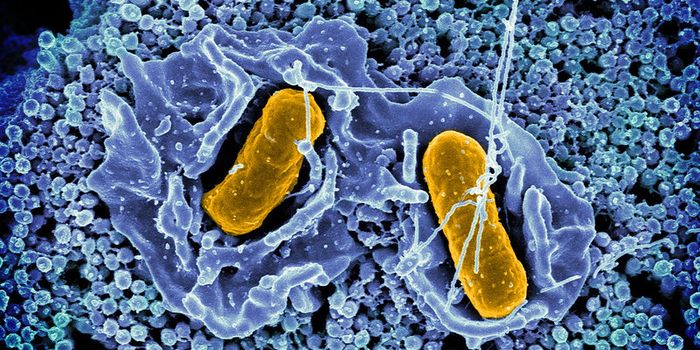The Ebola outbreak in West Africa has claimed nearly 12,000 lives since 2014, leaving researchers scrambling to develop effective vaccines and therapies. University of Iowa researchers have a possible solution, however. They want to treat Ebola using
gamma interferon (IFN-?).
Ebola is transmitted by direct contact with infected blood and body fluids. Symptoms of infection appear between 2 and 21 days after exposure and include fever, severe headache, vomiting, diarrhea, and hemorrhaging. In most cases, the mortality rate is 50%.
Ebola infection occurs in two stages. First, the virus infects macrophages and dendritic cells in the spleen, lymph nodes, and liver. Second, after replicating in these cells for 3 to 4 days, the virus is shed into the bloodstream where it goes on to infect multiple other cell types. Since IFN-? is known to activate macrophages and induce an antiviral state, the group reasoned that IFN-? treatment might inhibit Ebola during the first stage of infection.
According to
study author Wendy Maury, Ebola “goes from an early stage with a very targeted infection of only these few cell types (macrophages and dendritic cells), to everything being infected … we think what’s happening with gamma interferon is that it’s targeting macrophages and blocking the infection of those initial cell targets so you don’t get the second round of infection”.
The group infected mice with a mouse-adapted "Ebola virus" (vesicular stomatitis virus expressing Ebola surface glycoproteins), then treated them with gamma interferon. When treated up to 24 h after infection, the mice were completely protected. The group then investigated the mechanism by which IFN-? protected cells from the virus. They identified 160 genes that were upregulated in macrophages by IFN-? treatment. When a handful of these genes were upregulated experimentally, they helped ward off infection.
The only drawback is that IFN-? treatment is probably only effective at the early stage of infection. According to Maury, “My guess is that if you delay the gamma interferon too much, you miss this window of opportunity to block the infection in macrophage cells and the gamma interferon can no longer provide protection”.
Sources:
Science Daily,
PLOS Pathogens,
WHO,
CDC,
Wikipedia


![[Guide] 7 Strategies to Boost Laboratory Collaboration](https://d3bkbkx82g74b8.cloudfront.net/eyJidWNrZXQiOiJsYWJyb290cy1pbWFnZXMiLCJrZXkiOiJjb250ZW50X2FydGljbGVfcHJvZmlsZV9pbWFnZV83YzBjZWIwM2Y5YzI4MmFlYzBhZDZhMTcyNTQ1ZGU3YmE4Y2MzMDYyXzUxNDkuanBnIiwiZWRpdHMiOnsidG9Gb3JtYXQiOiJqcGciLCJyZXNpemUiOnsid2lkdGgiOjcwMCwiaGVpZ2h0IjozNTAsImZpdCI6ImNvdmVyIiwicG9zaXRpb24iOiJjZW50ZXIiLCJiYWNrZ3JvdW5kIjoiI2ZmZiJ9LCJmbGF0dGVuIjp7ImJhY2tncm91bmQiOiIjZmZmIn19fQ==)






